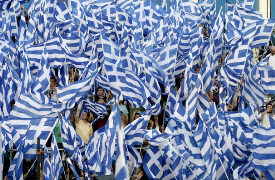Greeks angered by austerity took to the polls on Sunday for an election that could decide their future in the eurozone amid unprecedented external pressure not to vote for a radical leftist party.
 Greeks angered by austerity took to the polls on Sunday for an election that could decide their future in the eurozone amid unprecedented external pressure not to vote for a radical leftist party.
Greeks angered by austerity took to the polls on Sunday for an election that could decide their future in the eurozone amid unprecedented external pressure not to vote for a radical leftist party.
Some 9.9 million Greeks began voting at 04:00 GMT in what is expected to be a close contest between the pro-bailout New Democracy conservative party and the anti-austerity Syriza party that has spooked European leaders and the markets.
Greek newspapers said the vote was the most critical since the end of military rule in 1974 as conservative chief Antonis Samaras argued that a "new era" would begin for the recession-hit eurozone state on Monday.
German Chancellor Angela Merkel on Saturday said it was "extremely important" for Greeks to elect lawmakers who would respect the terms of a controversial bailout, which Syriza leader Alexis Tsipras says will be "history" on Monday.
Eurogroup chief Jean-Claude Juncker also warned on the eve of the vote that choosing Syriza could have "unpredictable" consequences for the eurozone as international markets watched the momentous vote with bated breath.
Voting ends at 1600 GMT, with exit polls also due out then and the first indicative results expected at around 1900 GMT in the second election in six weeks after a vote on May 6 failed to produce a government.
 Tsipras argues that the mood in Europe is shifting against austerity and that the European Union and International Monetary Fund will not want to risk a Greek euro exit that would send shockwaves through the global economy.
Tsipras argues that the mood in Europe is shifting against austerity and that the European Union and International Monetary Fund will not want to risk a Greek euro exit that would send shockwaves through the global economy.
Samaras wants a more moderate renegotiation of the bailout deal and warns that a vote for Tsipras could bring back the drachma currency.
Polls show an overwhelming majority of Greeks want to keep the euro.
In their public comments at least, European leaders warn that Greece must respect its international debt commitments or risk leaving the euro club, and the EU and the IMF have suspended loan payments until after the elections.
Greece has already been forced to seek bailouts twice, first for 110 billion euros in 2010 and then for 130 billion euros this year plus a 107-billion-euro private debt write-off -- for a total of 347 billion euros ($439 billion).
There have been suggestions that there is at least some room for compromise on the bailout conditions and a former Greek government adviser said a crucial deficit-cutting deadline could be extended to 2016 instead of 2014.
Greece is now in its fifth year of recession, and many young Greeks are voting with their feet by emigrating, while local media reports warn the state will run out of cash to pay public-sector salaries and pensions on July 20.
No single party is expected to win enough votes to secure a majority in parliament, and the days to come are likely to be dominated by coalition talks.